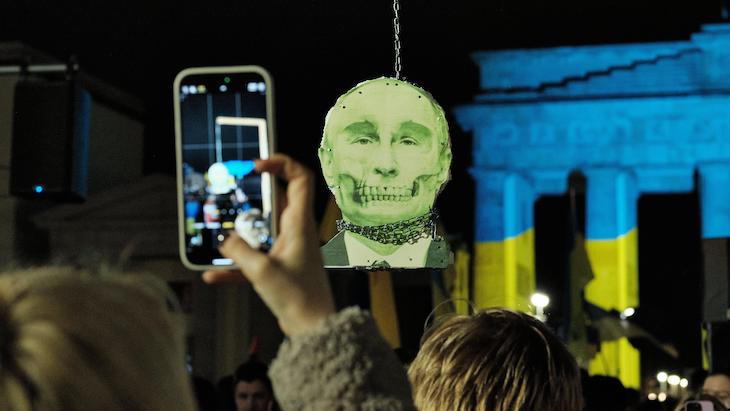The real winners of Germany’s election are sitting in Moscow. Despite Friedrich Merz’s Christian Democrats (CDU) technically claiming victory with a meagre 28 per cent showing, the truly remarkable surge belongs to the openly pro-Russian forces that now dominate the political landscape. The far-right Alternative for Germany (AfD) and the far-left party Die Linke (successor to East Germany’s communist SED) have emerged from this record 85 per cent turnout election with unprecedented strength: both unapologetically aligned with Vladimir Putin’s interests and fundamentally opposed to Germany’s Western orientation.
That this Russification of German politics coincides with the third anniversary of Russia’s invasion of Ukraine feels less like coincidence and more like strategic triumph for the Kremlin and its numerous attempts to undermine Western elections. Merz, who has waited in the wings since his political defenestration by Angela Merkel in 2004, will be celebrating his personal revenge. But his victory increasingly resembles pyrrhic symbolism as Germany’s democratic expression tilts eastward. It’s a bleak outlook to the security challenges the continent faces through Putin’s aggression.
More alarming still is Merz’s post-victory proclamation that Nato could be finished – and his call for a European military alliance independent of the United States. That he’s already pencilling in the alliance’s demise before the next Nato summit in June reveals how thoroughly Russian talking points have permeated Germany’s political mainstream. His desperate plea for British and French nuclear protection in the face of American withdrawal would have delighted strategists in the Kremlin mere months ago. Now it’s becoming reality.
The timing couldn’t be more perfect for Moscow. As Donald Trump and Vladimir Putin engage in their macabre dance over Ukraine’s future, Europe’s largest economy is effectively announcing its divorce from the post-war security architecture. Merz’s sudden pivot toward a Franco-British nuclear umbrella – complete with uncomfortable questions about “when, how and at what scale” nuclear weapons might be contemplated – suggests a level of strategic panic that plays perfectly into Russia’s long game of splitting Nato from within.
Meanwhile, the democratic outcomes speak volumes about Germany’s direction. With the liberal FDP – the only consistently pro-Ukrainian voice in German politics and advocate for delivering crucial Taurus missiles to Kyiv – now expelled from parliament entirely, the remaining political forces have shown varying degrees of Russian accommodation. The Social Democrats’ disastrous showing (their worst since the 1890s) punishes the one party that occasionally showed backbone against Putin, albeit inconsistently. Remember how Germany was divided until 1990? That is precisely how Germany is split politically after this election.
The elimination of the market-liberal FDP represents a catastrophe for Germany’s Western orientation. Their parliamentary ejection effectively silences the last truly Atlanticist voice in German politics. Meanwhile, the AfD and Die Linke Party – both enthusiastically pro-Russian and USA-sceptic – have cemented their position as the true beneficiaries of the electoral realignment. Truly the only winning parties of this election.
Adding to this perfect storm, president Volodymyr Zelensky’s offer to fall on his sword for Ukraine’s Nato membership – promptly dismissed by Trump as the gesture of a “dictator” – underscores how completely Western solidarity has unraveled. Germany’s electoral results represent less democratic expression and more strategic capitulation to years of Russian influence operations. When what Europe needs is a steadfast, clear-headed Berlin, it faces the opposite.
Former Chancellor Angela Merkel’s disastrous legacy continues to enable this eastward drift. Her open-door migration policy not only created the vacuum that the AfD eagerly filled, but also pushed her own CDU leftward while abandoning traditional conservative voters. More significantly, her energy policies made Germany pathologically dependent on Russian gas, creating economic vulnerabilities that Moscow has expertly exploited. The seeds of Germany’s current Russophilia were planted during her seemingly stable tenure.
Perhaps most concerning is the message this electoral outcome sends to Germany’s eastern neighbours. Poland and the Baltic states, already nervous about Berlin’s wavering commitment to European security, will find confirmation of their worst fears in these results. The traditional Franco-German engine that once drove European integration now seems more likely to deliver Europe into a new accommodation with Moscow than to strengthen Western resolve against Russian aggression. This led to French president Emmanuel Macron having to scramble to show European leadership during his White House tête-à-tête with President Trump.
The irony is palpable: in demonstrating the vitality of German democracy through record turnout, voters may have inadvertently delivered precisely the outcome the Kremlin has spent decades engineering – a Germany drifting from its Western moorings and increasingly receptive to Russian influence – and a German population very much receptive for its propaganda and lies. As Merz attempts to form a government with the weakened Social Democrats, his ability to resist this tide seems questionable at best.
For Britain and its allies, the message couldn’t be clearer: the comfortable certainties of post-war European politics are dead. Gone are the discussions about European integration, having been exchanged for more security focused future in which Britain will have to play a main role. Germany, once the predictable bulwark against Russian influence in Europe, has transformed into Moscow’s most valuable strategic prize. Those who believed that post-Merkel Germany would return to its role as Europe’s steady anchor have been served a brutal reality check. As Berlin stumbles toward an uncertain future, the rest of us would do well to remember that when German democracy catches a cold, Europe risks pneumonia. This time, it appears to be terminal. Russia will be delighted.







Comments